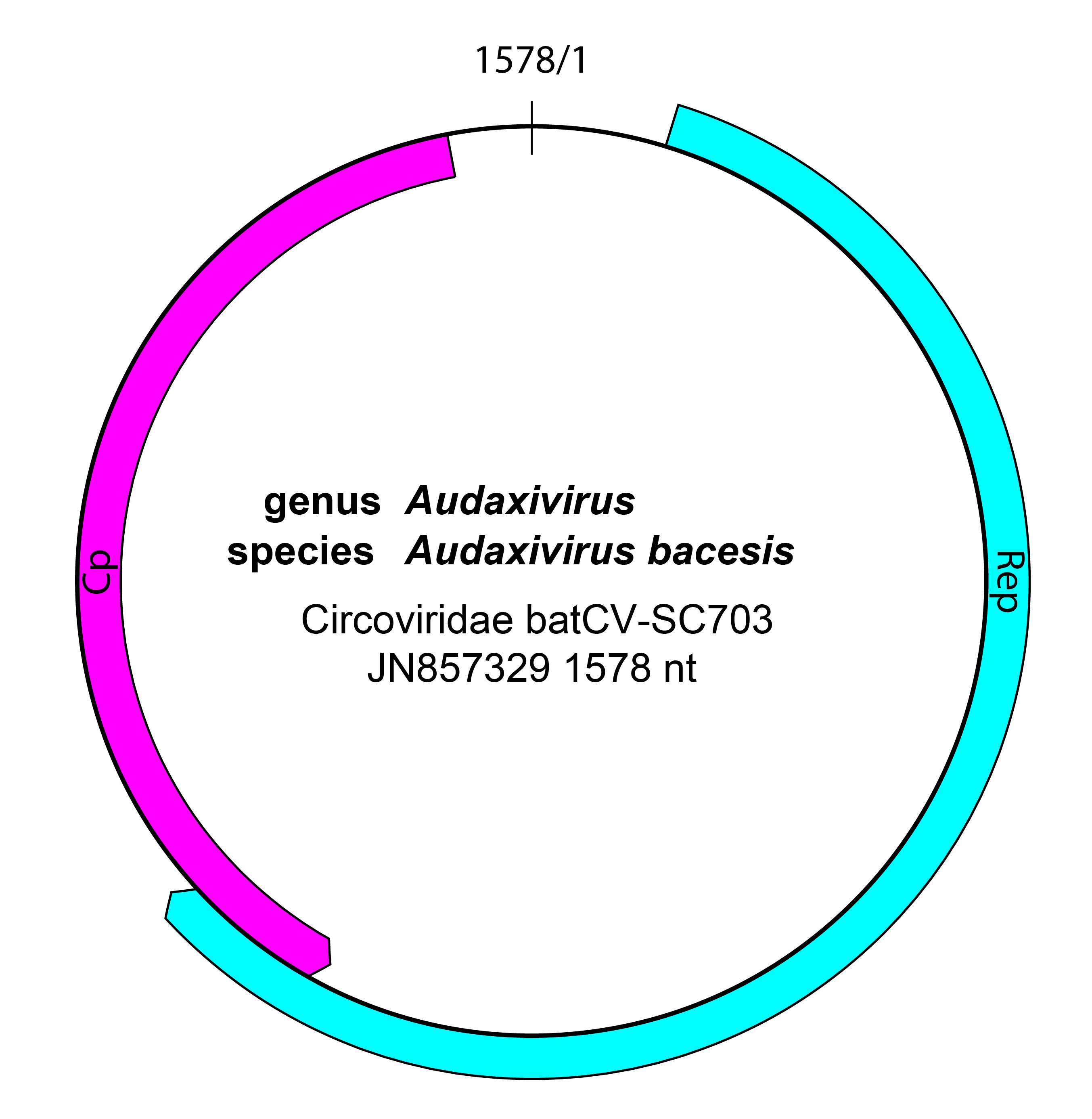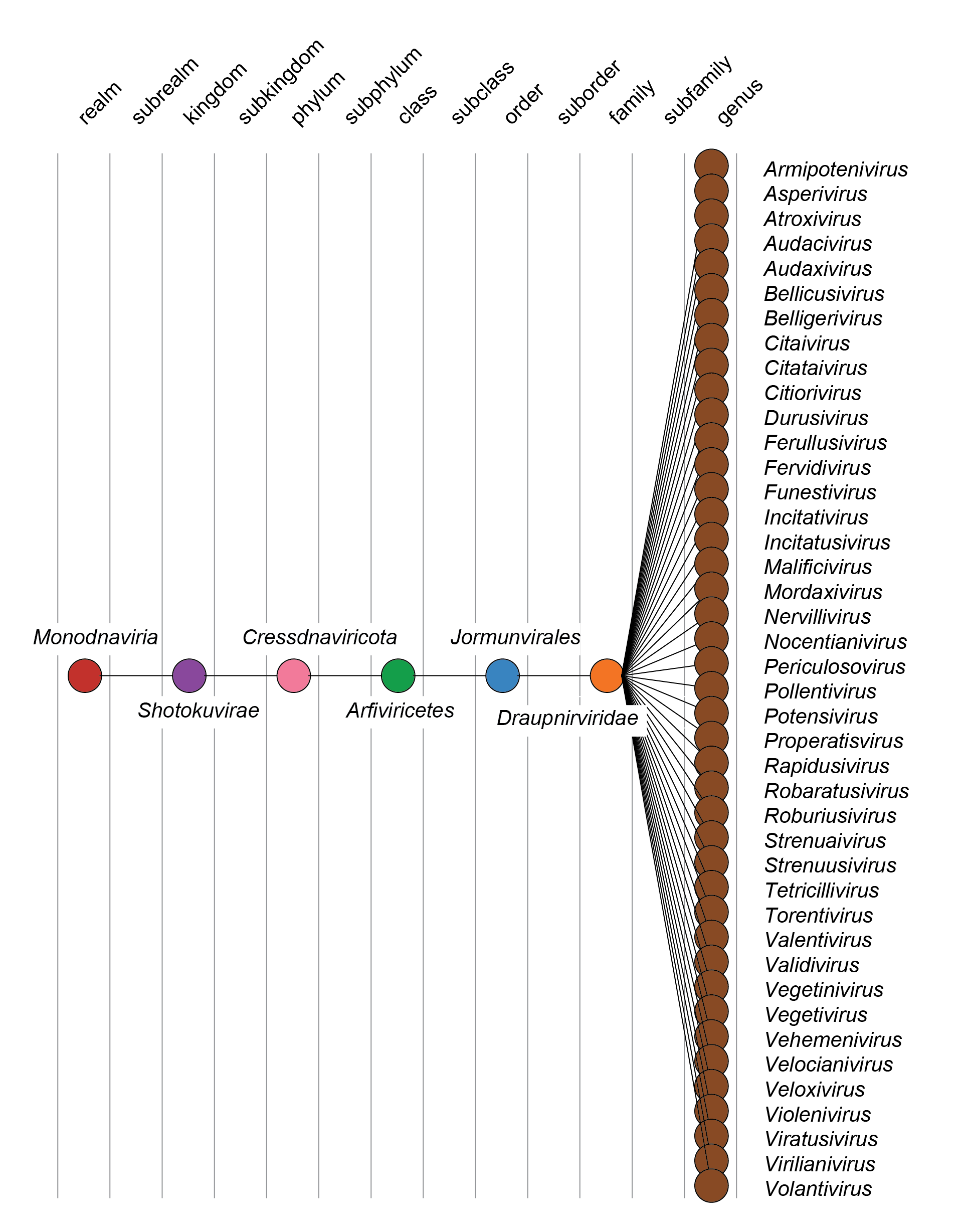Family: Draupnirviridae (Interim Report)
This is a summary page created by the ICTV Report Editors using information from associated Taxonomic Proposals and the Master Species List.
Edited by: Arvind Varsani
Posted: December 2024
Summary
The family Draupnirviridae includes ssDNA(+/-) viruses of invertebrates and vertebrates (Table 1 Draupnirviridae). The family Draupnirviridae was established in 2024 (Master Species List #39).
Table 1 Draupnirviridae. Characteristics of members of the family Draupnirviridae.
| Characteristic | Description |
| Example | Circoviridae batCV-SC703 (JN857329), species Audaxivirus bacesis, genus Audaxivirus |
| Virion | Unknown |
| Genome | ssDNA(+/-), 1 circular segment, 1.5–5.3 kb (Figure 1 Draupnirviridae) |
| Replication | Rolling-circle, SF3 helicase |
| Translation | Unknown |
| Host range | Invertebrates, vertebrates |
| Taxonomy | Realm Monodnaviria, kingdom Shotokuvirae, phylum Cressdnaviricota, class Arfiviricetes, order Jormunvirales: 42 genera, 67 species (Figure 2 Draupnirviridae) |
 |
| Figure 1 Draupnirviridae. Genome organisation of Circoviridae batCV-SC703, a member of the family Draupnirviridae. Boxes indicate open reading frames as annotated on GenBank accession JN857329. |
 |
| Figure 2 Draupnirviridae. Taxonomy of the family Draupnirviridae. For clarity, only genera are shown; details of species are given in the Member species table at the bottom of this page. |
Derivation of names
(genus names are derived from Latin gladiator names)
Armipotenivirus: from Armipotens (English origin) meaning powerful
Asperivirus: from Asper meaning hope answered
Atroxivirus: from Atrox meaning savage and bloody or cruel
Audacivirus: from Audacia meaning boldness or courage
Audaxivirus: from Audaxi meaning daring
Bellicusivirus: from Bellicina meaning female warrior
Belligerivirus: from Belliger meaning bringer of war
Citaivirus: Cita meaning a woman with agility
Citataivirus: from from Citata meaning an agile warrior
Citiorivirus: from Citior meaning with a lot of speed
Draupnirviridae: from the ring Draupnir of Norse mythology, said to have multiplied itself every ninth night, referring to both the circular viral genome and genome replication of viruses of the family; the suffix viridae for family taxa
Durusivirus: from Durus meaning hard or fast
Ferullusivirus: from Ferullus meaning as strong as iron
Fervidivirus: from Fervida meaning boiling hot
Funestivirus: from Funestus meaning calamitous, deadly or, fatal
Incitativirus: from Incitata meaning fast-moving, aroused or passionate
Incitatusivirus: from Incitatus meaning swift
Malificivirus: from Malificia meaning evil
Mordaxivirus: from Mordax meaning biting or snappish
Nervillivirus: from Nervilla meaning tough and small
Nocentianivirus: from Nocentianus meaning determined killer or fierce warrior
Periculosovirus: from Periculosa meaning dangerous
Pollentivirus: from Pollentius meaning one who has power
Potensivirus: from Potens meaning powerful, to confer potency
Properatisvirus: from Properatus meaning to hasten
Rapidusivirus: from Rapidus meaning swift and fierce
Robaratusivirus: from Robaratus meaning one with strength
Roburiusivirus: from Roburius meaning one with strength and fury
Strenuaivirus: from Strenua, Goddess of the new year, associated with well-being and purification
Strenuusivirus: from Strenuus meaning vigorous
Tetricillivirus: from Tetricilla meaning a harsh and cruel woman
Torentivirus: from Torentius meaning a treacherous river
Valentivirus: from Valentia meaning a powerful female
Validivirus: from Validus meaning strong and powerful
Vegetinivirus: from Vegetinus meaning powerful one
Vegetivirus: from Vegetus meaning power or strength
Vehemenivirus: from Vehemens meaning emphatic, vigorous or lively
Velocianivirus: from Velocianus meaning rapid or fast
Veloxivirus: from Velox meaning swift
Violenivirus: from Violens meaning destructive action
Viratusivirus: from Viratus meaning strong or virility
Virilianivirus: from Virilianus meaning manly or energetic
Volantivirus: from Volantius meaning flying

